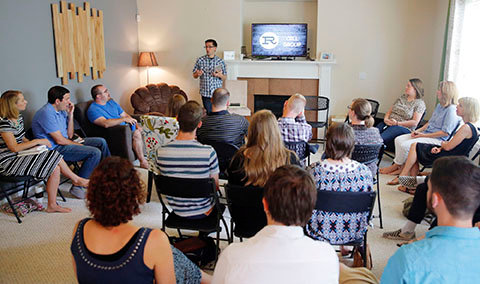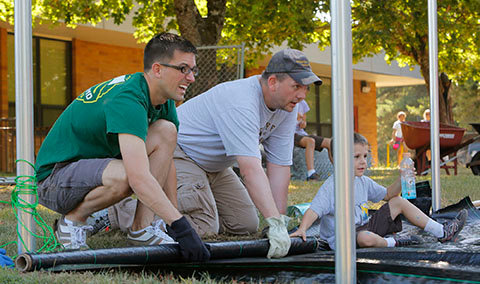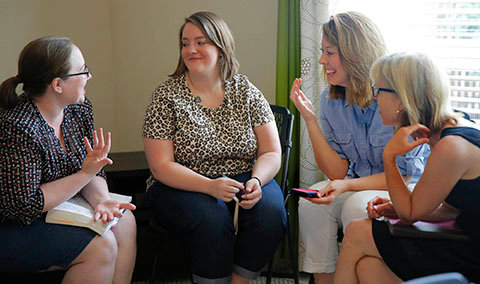EDITOR'S NOTE: The annual Week of Prayer for North American Missions, held this year March 6-13, and the Annie Armstrong Easter Offering provide support for missionaries who serve on behalf of Southern Baptists across North America. With a goal of $70 million, this year's offering theme is "Here I am. Send Me." For more information, visit anniearmstrong.com.
 Raised by his grandparents, Josh Carter grew up watching his grandfather pastor a small church. Today, he is starting a church in Portland. SUSAN WHITLEY/NAMB
Raised by his grandparents, Josh Carter grew up watching his grandfather pastor a small church. Today, he is starting a church in Portland. SUSAN WHITLEY/NAMBPORTLAND, OR (BP) — When Josh Carter and his family migrated 2,700 miles from east Tennessee to the Pacific Northwest, he found his people – mountain people – in Oregon. The move was out of obedience to God's call on the family.
But Carter's preparation didn't happen without hardship and a spiritual battle.
The product of a broken home, grandparents helped in the raising of Carter and his two siblings in east Tennessee. Under the tutelage of his grandfather, who pastored an 80-member country church, Carter made a profession of faith in Christ.
In college, he became active in ministries and even started a church in east Tennessee with his wife Amy, whom he had known since kindergarten in Kingsport, TN. Carter was 21, a newlywed, and in over his head.
"I had no idea how to lead," he said.
By age 23, Tri-Cities Baptist Church in Gray, TN, invited him to be their interim youth leader. He served in that role for seven years before joining the lead pastor staff and supervising youth and family ministries. The church grew rapidly and afforded multiple opportunities for Carter, including international mission trips.
"Life was awesome," Carter said. Then he started wondering, "What would it look like to go to a place where there's not a lot of mobilizing and not a lot of activity regarding evangelicals?"
Carter knew his family could stay where substantial ministry was happening at Tri-Cities.
"It's not bad for me to stay here," he concluded. "But, for me, my life would be worthless unless I followed in obedience the call in my life of going to an unreached people and raising disciples among them."
The Carters considered some international venues, and then they began to look west.
About that time, Mike Laughrun became the Tri-Cities Baptist Church pastor. He had helped Vance Pitman plant Hope Church in Las Vegas. Hope Church has been a model for westward expansion since its inception, and they have a residency program for people like Carter and his family. As Laughrun moved Tri-Cities toward planting its first church, the Carters agreed to move west for a year-long residency at Hope Church.
"We moved out of our culture and allowed God to speak to us," Carter said.
Once in Las Vegas, they began visiting other western cities.
"The first time we flew into Portland, we said we would not go there," Carter said. "Portland scared me because I didn't want to be a failure in church planting."
Portland's reputation for church planting is not pristine. Some have called it a church planting graveyard; others call the region America's dark corner. Typically, Portlanders don't warm up to evangelicalism.
Yes, Carter had experienced a rough patch as a 21-year-old church planter, but since then he had become a competent and successful ministry leader.
 Portland church planter Josh Carter was content with his Tennessee life, but he kept wondering what it would look like to minister in a largely-unreached area of the world. Here Carter, left, works on a playground project in Portland with Sending Church member Brad Christensen, from Hope Church, Las Vegas. Carter apprenticed at Hope Church and members regularly come to support the church plant. SUSAN WHITLEY/NAMB
Portland church planter Josh Carter was content with his Tennessee life, but he kept wondering what it would look like to minister in a largely-unreached area of the world. Here Carter, left, works on a playground project in Portland with Sending Church member Brad Christensen, from Hope Church, Las Vegas. Carter apprenticed at Hope Church and members regularly come to support the church plant. SUSAN WHITLEY/NAMBCarter acknowledged, "God would not tell me where I was going next because He had to root out of me the idea that it was me building the church." They loved Las Vegas and hoped for a calling to San Diego. But Portland kept ringing.
In a conversation with Amy, Carter told her that even though he didn't want to go there, he couldn't get Portland off his mind. "She would cry and say, 'I can't either,'" he said.
The staff and congregation at Hope Church already knew.
"Most people around you know before you know," Carter said. "They all knew we were going to Portland."
Tri-Cities has supported and mentored the Carters since they were young. They continue to support them in Portland as their sending church.
"I have known Josh and Amy Carter since they were in high school," said Jeff Palmeter, global outreach pastor for Tri-Cities. "Amy babysat for us when our children were younger. They grew up in our church.
"We chose to support them because we know them well, and we believe that the local church is the one who sends out planters. Josh has a great vision to be regularly sending out church planters and investing in church planting over many years. We see Josh as being the beginning, a catalyst, of this movement within our church," Palmeter said.
Portland is a city of 2.3 million people comprised of multiple 10-minute communities. Residents are loyal to their neighborhoods and have virtually all necessary services available to them within a 10-minute drive. A predominant value is tolerance in a freethinking, new-age, and eclectic culture that is perhaps best symbolized by the television show "Portlandia." Few families are looking for a church.
 Amy Carter, second from right, interacts during a Bible study of Remedy Church hosted in her home. One difficulty that Portland church planters face is the lack of available meeting spaces, so Remedy's congregation comes together in multiple cell-groups hosted in homes around the area. SUSAN WHITLEY/NAMB
Amy Carter, second from right, interacts during a Bible study of Remedy Church hosted in her home. One difficulty that Portland church planters face is the lack of available meeting spaces, so Remedy's congregation comes together in multiple cell-groups hosted in homes around the area. SUSAN WHITLEY/NAMBThe Carters settled in affluent and multi-ethnic west Portland. Residents are highly educated and self-sufficient.
Their strategy is to start Remedy City Church, where Christ, through His body is the remedy for the city, by creating multiple home city groups. They have hosted the first group in their home and have taught curriculum they call "The Jesus Life." Their goal is to launch Remedy formally after establishing at least three city groups, which other east Tennesseans who have joined the Carters in the Pacific Northwest will likely host.
"It's hard to meet up here because there's no place to meet," Carter said. "We're trying to stay in the homes as long as we can."
They are in Portland, in part, because of the finances available from the North American Mission Board through the Annie Armstrong Easter Offering and the Cooperative Program.
"NAMB supports us and allows us to do what we do," Carter said.
Getting to Portland – and being there – has presented challenges for the Carters. But now they understand better why God led them there.
"It's not so much about what God wants to do with you but what God wants to do in you," Carter said.
Reprinted from Baptist Press (www.baptistpress.com), news service of the Southern Baptist Convention.